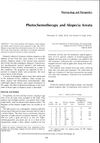Oral Tofacitinib: A Promising Treatment in Atopic Dermatitis, Alopecia Areata, and Vitiligo
October 2017
in “
Clinical and Experimental Dermatology
”
tofacitinib Janus kinase inhibitor JAK-1/3 inhibitor atopic dermatitis alopecia areata vitiligo T helper 2 immune response interferon-y signaling Eczema Area and Severity Index EASI Vitiligo Area Scoring Index VASI hyperlipidemia neutropenia lymphopenia anaemia hepatitis serum creatinine creatine kinase JAK inhibitor AD AA IFN-y EASI score VASI score

TLDR Oral tofacitinib shows promise in treating atopic dermatitis and alopecia areata, but only slight improvement in vitiligo.
The document discussed a case where oral tofacitinib, a Janus kinase (JAK)-1/3 inhibitor, was used to treat a 44-year-old man with atopic dermatitis (AD), alopecia areata (AA), and vitiligo, which were refractory to other treatments. Tofacitinib is thought to benefit AD by downregulating the T helper 2 immune response and may also affect AA and vitiligo by downregulating interferon (IFN)-y signaling. The patient showed significant improvement in AD after 3 months, with a complete remission (Eczema Area and Severity Index (EASI) score from 14.4 to 0.0), and slow but continued improvement in AA with increased hair growth. However, only marginal improvement was observed in vitiligo (Vitiligo Area Scoring Index (VASI) score from 4.68 to 3.95). Tofacitinib was well tolerated with no serious adverse effects, although monitoring for potential side effects like hyperlipidemia, neutropenia, lymphopenia, anaemia, hepatitis, and elevated serum creatinine and creatine kinase levels was necessary. The case adds to the limited evidence supporting the use of tofacitinib in these conditions, but randomized controlled studies are needed to validate its efficacy.




